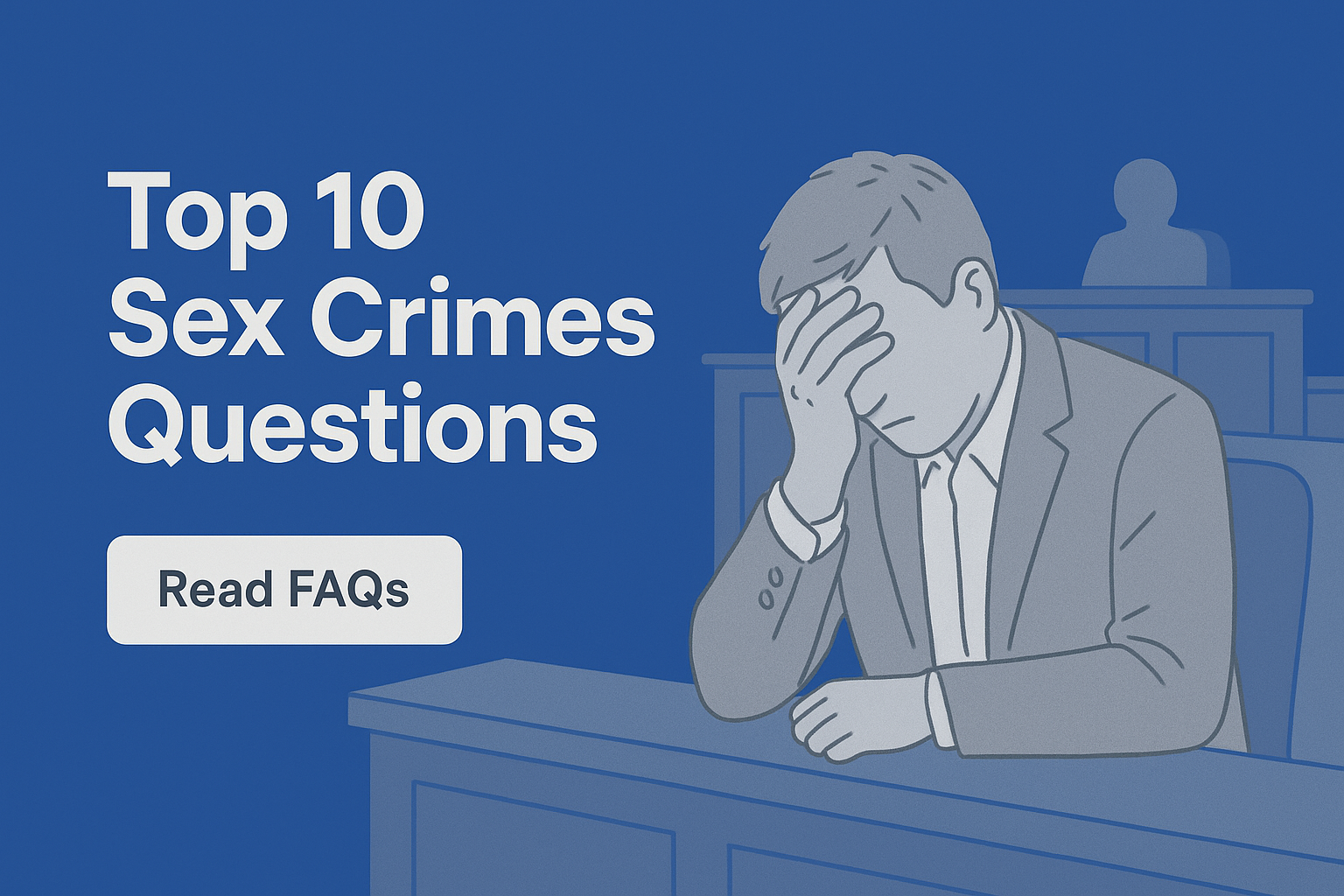Additional Links
- Criminal Lawyers With Payment Plans
- If I’m Convicted of a Sex Crime, Do I Have to Register as a Sex Offender?
- What Are the Penalties for Sexual Assault in Missouri?
- What to Do If You're Accused of a Sex Crime
- Missouri Revised Statutes
- Missouri Criminal Defense Resources
- Legal Books
- Defending Freedom Podcast
- Legal Videos

Sex Offender Registries
Sex offender registry laws have existed in many states for decades. For example, the first sex offender registry in the U.S. was implemented by California in 1947.
However, the momentum for these laws increased in 1997 when the federal government required states to participate in the National Sex Offender Registry by registering offenders convicted of federal sex crimes or found guilty by court-martial. Not coincidentally, Missouri passed its sex offender registry law in 1997.
We handle cases like your every day. Reach out to our St. Louis failure to register as a sex offender lawyers now at (314) 900-HELP.

The government has advanced two purposes in putting forth these laws.
First, by maintaining current information on people convicted of sex offenses, authorities have a readily available investigative tool when sex crimes occur. The false presumption is that all sex offenders are incurable and that any new crime must have been committed by a repeat perpetrator.
Second, notifying the public of a convict’s prior offense allows people to protect themselves. Again, this is based on the erroneous idea that a sex offender moving into a neighborhood always presents a danger to their new neighbors.
Despite the shaky justifications for these public registries, courts have consistently deemed them Constitutional.

Missouri’s Sex Offender Registry Statutes
The Missouri Revised Statutes contain several laws defining the state’s registration requirements and associated offenses in the chapter entitled “Crime Prevention and Control Programs and Services.”
The laws contain two offenses; however, only one applies to registration. The other law restricts registered sex offenders’ activities on Halloween.
Failure to Register as a Sex Offender in St. Louis
This offense occurs when someone required to register fails to meet the outlined requirements. It doesn’t require any specific state of mind, meaning you could face this charge whether you intentionally avoided registering or negligently failed to determine your registration requirement.
This crime is something of a misnomer because you can commit it even though you registered as a sex offender. A more accurate name would be “failure to meet sex offender registration requirements.”
To understand this offense, you must understand the statutes that define the registration requirements, including the following:
Offenders Required to Register in St. Louis
Your duty to register arises from the offense you were convicted of.
The law doesn’t require those accused but not convicted of sex offenses to register. Instead, the duty to register arises upon conviction and after release from custody. As a result, the law requires courts, parole and probation agents, and correctional facilities to notify registrants of their legal duties.
The law classifies registrants into three tiers based on their crimes and whether they were repeat offenders. Each tier has different terms and requirements for check-ins.
Tier I offenders must register for 15 years and check in annually. Tier I offenses include:
- First-degree sexual abuse against an adult victim
- Sexual misconduct involving a child for first offenses
- Second-degree sexual abuse
- Second or third-degree kidnapping
- Sexual conduct with a nursing facility resident or vulnerable person
- Sexual contact with an adult prisoner or offender
- Sex with an animal
- Sex trafficking of an adult
- Possession of child pornography
- Second-degree child molestation
- Invasion of privacy against a minor
Tier II offenders must register for 25 years and check in semi-annually. Offenses in this category include:
- Second-degree statutory sodomy against a 16 or 17-year-old victim
- Third or fourth-degree child molestation
- Sexual contact with a student 13–17 years old
- Enticement of a child
- Sexual abuse of a child 13–17 years old
- Sexual exploitation of a minor
- Promoting child pornography
- Patronizing prostitution
- Sexual contact with a prisoner or offender 13–17 years old
Tier III offenders must check in quarterly and register for life. This tier includes convictions for the following:
- Rape and statutory rape
- Endangering the welfare of a child if the offense was sexual
- Sodomy and statutory sodomy
- A second or subsequent offense of sexual misconduct involving a child
- First-degree sexual abuse against a victim under 13
- First-degree kidnapping of a minor (excluding parental kidnapping)
- Child kidnapping
- Incest
- Child molestation
- Promoting prostitution
- Sex trafficking of a minor
- Sexual trafficking of a child
- Sexual contact with a student under 13
- Creating or promoting child pornography
Tier III also includes anyone found by a court to be a predatory or persistent sexual offender.
An offense occurs if you fail to register within three days of your release from custody, neglect to check in as scheduled, or stop registering before your term ends.
Information Required
Registrants are required to provide the following information:
- Name
- Online identifiers
- Address and phone number
- Birthdate
- Social Security number
- Vehicle description and license plate number
- Place of employment or study
- Description of the offense
- Date and place of conviction
- Age and gender of the victim
- Fingerprints
- Photograph
- DNA sample
Prosecutors can pursue charges if you omit or lie about any required information. For example, you might face consequences if you give your address but not your significant other’s address, where you occasionally stay overnight.
Duty to Report Changes
One of the most common grounds for charges arises when a registrant fails to update the registry.
Registrants must report changes to any of their information within three days. This update is mandatory, even if it’s only temporary. Thus, you may face charges if you get evicted from your home and fail to report that you’re staying with a friend for a few days while looking for a new place to live.
Possible Defenses Against Failure to Register as a Sex Offender in St. Louis, MO
Your attorney can raise several defenses to a charge for failure to register. Before getting into them, you should be aware of one argument that probably won’t succeed.
Missouri doesn’t consider a claim that you were ignorant of the law a valid defense to a criminal charge. You have a legal duty to understand the requirements that apply to you under Missouri’s sex offender registration law.
That said, you can rely on any of the following criminal defense strategies:
Impossibility
This defense applies if you can’t meet your registration requirement for some reason. Similar to the defense of necessity, impossibility declares that you’re unable to perform the required actions.
For example, suppose that you were hit by a car and confined to a hospital bed with a broken spine for six months. You could argue that you couldn’t update the registry to provide the hospital’s address.
Incorrect Information
While you can’t assert ignorance of the law as a defense, you can claim that you reasonably relied on an official interpretation of the law.
Let’s say you registered as required, and an official informed you that you didn’t need to return until your next birthday. You may have a valid defense if you missed a check-in because of the official’s incorrect legal interpretation.































